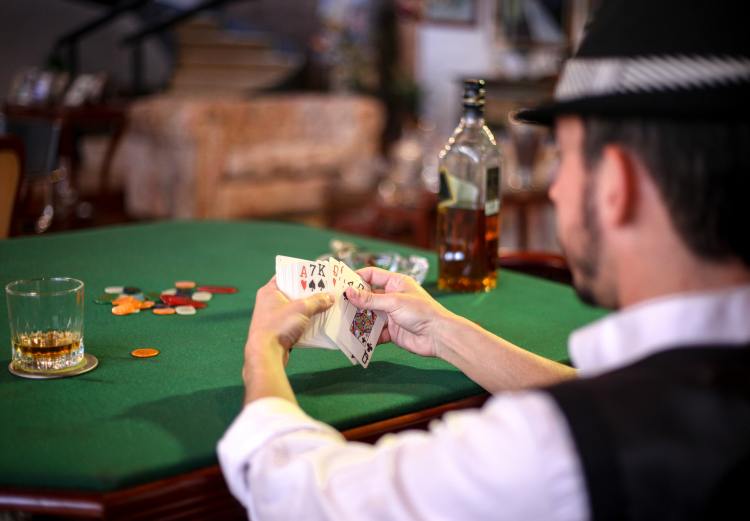If you play in a public poker room, you will hear many cardroom homilies, expressions that regular cardroom habitués say thinking they’re being clever or original. Maybe the first time you heard one of these you thought it was cute, but, do they hold up? Here are two.
Cardroom Homilies

Cardroom Homilies
If you play in a public poker room, you will hear many cardroom homilies, expressions that regular cardroom habitués say thinking they’re being clever or original. Maybe the first time you heard one of these you thought it was cute, but, when you play regularly you will hear the same tired expressions over and over. Here are two.
“Think long; think wrong”
This is a favorite of those players whose thought processes are reduced to rhyming couplets. What they’re saying is that the longer it takes to make up your mind in a difficult situation, the likelier you are to make the wrong decision. They also believe the other side of that particular coin, that the faster you decide the better chance you have of deciding correctly. This applies most often in a no-limit game, where players sometimes have to ponder calling huge bets with semi-marginal hands.
The expression seems to be the cardroom equivalent of, “Act in haste; repent at leisure,” or maybe, “Look before you leap.” But for every old saw heard in the outside world — outside of cardrooms, that is, or in the “real” world — there seems to be a contradictory maxim. For these two it is, “He who hesitates is lost.” Maybe the counsel in favor of thinking it over is the wiser, because there seem to be more homilies on that side of the fence. “Fools rush in where wise men fear to tread” is another. (Although I prefer “Fools rush in and get all the good seats.”)
Opinion at best seems to be divided. But, like every hackneyed phrase, it can’t cover all situations. There are times when your initial hunch is the right reading for a situation; other times you need to consider all of the possibilities. For example, you’ve passed the second nuts, the second-best possible hand for the situation, in no-limit hold’em and the tightest player at the table has just slammed his entire stack in the pot. Your initial reaction would be to quickly dump your hand; after all, no one has ever seen the guy bluff. But, wait a minute; stop and reflect. He doesn’t usually slam his chips in the pot. He unobtrusively eases them, so as not to attract attention to himself, to make it easier for you to call when you’ve passed a calling hand. And when he does have the nuts he doesn’t usually bet all his chips. While you sit there thinking, someone else at the table tries to hurry you up. “Think long; think wrong,” he says. If you had just reacted automatically — in other words, quickly — you would have just folded. But while you stopped and thought, you noticed several unusual aspects to his behavior, enough to convince you to call. And you do. And win a large pot when the guy gets caught bluffing for the first time in a week. Sure he got caught only once. But you can bet he bluffed more than that. He usually got away with it, because nobody dared call him. And had you not spent a few minutes in consideration, neither would you have called.
I’m not at all suggesting that you should always take a long time on poker decisions. That needlessly angers the other players, who make caustic remarks like, “Cahmon, we’re paying time here,” and, “If you don’t know what to do now, you never will.” Most plays are obvious and don’t need much thought. Once in a while, though, particularly in a no-limit game, you can take advantage of the extra time allowed players in crucial situations. You can think long and get it right, and put the lie to this too-frequently-heard cardroom homily.
“If you get caught bluffing, you lose the pot”
Another favorite in the clubs. Some wiseacre always says that right after you get caught trying to buy a big pot.
It’s not true, though. You can get caught, and still win a big pot.
Huh? you say. How do I do that?
The best time to bluff in a no-limit game is when one player is all in, and one or more other players are involved in a large side pot. They often fold, thinking they’re going to see your hand for free, so why pay for it? You profit by winning the side pot, and also by the “free” advertising. The situation is also good when one player is close to all in, and there are others in contention for the side pot. Again those others often fold thinking they will let the guy with “short money” “keep you honest.” Sometimes the guy with the short stack doesn’t even call, and you win the whole pot. But when he does, your share of the side pot is still more than the nothing you would get by just showing down your hand. Sometimes you even profit on the hand, even if not by the same amount as if you had won the whole pot.
So, you see, you can get caught bluffing, and win.
Photo by Denner Nunes from Pexels








